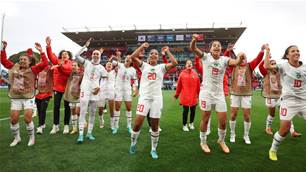ASIAN Football Confederation president Mohamed Bin Hammam has endorsed Sepp Blatter's 'six-plus-five' proposal to limit the number of overseas players eligible to play for a team to five.
The FIFA president's idea, which would see sides forced to field a minimum of six home-grown players, was backed by football's world governing body at their recent congress in Sydney in a move that is certain to anger Europe's biggest clubs.
While the 72-year-old's controversial plan will face stiff opposition from, among others, the European Commission due to its discriminatory nature, Bin Hammam nevertheless threw his weight fully behind the principle.
At present, the implementation would have little effect in Asia as the majority of domestic leagues already limit the number of foreign players allowed to register for a club, while continental competitions like the Asian Champions League and AFC Cup only allow three per team.
"The AFC doesn't have a big problem when it comes to '6+5' like Europe, but we have to be prepared for the future," Bin Hammam told the AFC's official website.
"In Asia, clubs at present limit themselves to registering three foreign players but as clubs seek to establish themselves, they might explore the possibility of signing up more foreigners.
"This can have a negative impact on young local talent.
"In the future, AFC will plan and work at the continental level towards curbing the influx and movement of foreign players to motivate domestic talent and give them more playing time."
Of more relevance to the region is FIFA's move to extend the naturalisation period of foreign players from two to five years before they can play for a national team, which will be keenly felt by countries like Qatar who have a number of swiftly-converted nationals amongst their ranks.
However, Bin Hammam also gave his backing to the ruling, insisting his organisation have long been on favour of the move.
"AFC has always felt that two years is not long enough and did not serve the purpose. The extension of the naturalisation period addresses that valid concern now," he added.
"With full respect to the sovereignty of countries, the window period of five years will help to preserve the spirit of the game and make sure football is played within ethical boundaries while making it more competitive."
While the 72-year-old's controversial plan will face stiff opposition from, among others, the European Commission due to its discriminatory nature, Bin Hammam nevertheless threw his weight fully behind the principle.
At present, the implementation would have little effect in Asia as the majority of domestic leagues already limit the number of foreign players allowed to register for a club, while continental competitions like the Asian Champions League and AFC Cup only allow three per team.
"The AFC doesn't have a big problem when it comes to '6+5' like Europe, but we have to be prepared for the future," Bin Hammam told the AFC's official website.
"In Asia, clubs at present limit themselves to registering three foreign players but as clubs seek to establish themselves, they might explore the possibility of signing up more foreigners.
"This can have a negative impact on young local talent.
"In the future, AFC will plan and work at the continental level towards curbing the influx and movement of foreign players to motivate domestic talent and give them more playing time."
Of more relevance to the region is FIFA's move to extend the naturalisation period of foreign players from two to five years before they can play for a national team, which will be keenly felt by countries like Qatar who have a number of swiftly-converted nationals amongst their ranks.
However, Bin Hammam also gave his backing to the ruling, insisting his organisation have long been on favour of the move.
"AFC has always felt that two years is not long enough and did not serve the purpose. The extension of the naturalisation period addresses that valid concern now," he added.
"With full respect to the sovereignty of countries, the window period of five years will help to preserve the spirit of the game and make sure football is played within ethical boundaries while making it more competitive."
Copyright (c) Press Association
Related Articles

Morocco blazing a trail for Arab women's football participation

FIFA blasted for OneLove armband threat













